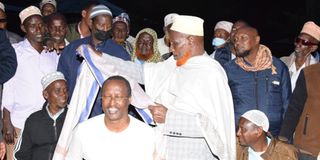Kuti, Doyo face off as development record top Isiolo campaigns

Elders from 12 Sakuye community clans in Isiolo endorse Governor Mohamed Kuti to seek re-election in 2022 polls.
Development and inclusion politics are dominating campaigns in Isiolo, with the two major political camps of Governor Mohamed Kuti and his predecessor Godana Doyo keen to bag a huge chunk of the county’s 86,000 votes.
Dr Kuti’s camp accuses Mr Doyo’s side led by Isiolo North MP Hassan Odha, Woman Rep Rehema Jaldesa, Nuh Mohammed Ibrahim (senator aspirant) and Isiolo South MP hopeful Mohammed Tupi of selfishness, saying the ex-governor did not include other communities in their lineup.
The five leaders, endorsed by Borana Council of Elders early last month, have accused Governor Kuti of political conmanship, saying he had run out of ideas and asking him to engage in issue-based politics.
Mr Doyo cried foul and wondered why the attack was only aimed at the Borana community while other communities were also planning and aligning themselves politically.
“Our people will not buy their lies. Every community is planning itself (just like us) and when the right time comes, we will all (communities) sit at the same table and talk together to see how we can grow our county,” the former governor said during a recent meeting at Mulata.
Governor Kuti recently said he would unveil his lineup that includes other communities outside his Sakuye clan.
“We are still consulting and we will soon reveal our team which will have the face of Isiolo,” he told Nation.Africa.
The need for inclusion is mostly raised by leaders from non-Muslim communities, and the debate intensified after Borana elders endorsed aspirants in Kinna on January 4, with some of those who lost in the nominations taking advantage of the situation to team up with other communities and “seek sympathy”.

Former Isiolo Governor Godana Doyo addresses Borana community elders during past meeting at Mulata.
The incumbent governor’s allies are capitalising on the narrative to depict the Borana lineup as unfair and one lacking the face of the cosmopolitan county to endear themselves to other communities.
They say that while some of the candidates may be endorsed by their respective communities, there should be room for other communities in the spirit of inclusion and diversity.
To counter the narrative, Borana leaders portray Dr Kuti as “hypocritical” for pushing for inclusivity while his government “is doing the opposite”.
“It is so unfortunate that our competitors say they mind the interests of other communities but their government is marred by favoritism,” Mr Doyo said.
He cited the influential posts of county secretary and County Public Service Board chairperson as among those occupied by people from Dr Kuti’s Sakuye clan.
As in Mr Doyo’s tenure, Governor Kuti’s deputy Abdi Issa and Speaker Hussein Roba are from the Somali and Borana communities respectively.
Mr Doyo’s county secretary, Ibrahim Godana Waqo, and the County Public Service Board chair were from the Borana and Gabbra communities, respectively, while municipality boss Ali Wako hailed from the Sakuye clan.
During Sunday’s meeting attended by Borana elders from across the county, the leaders promised to consider other communities for various positions once elected to office.
MP Odha and Mr Nuh said they valued partnerships with other communities and had no intentions of dividing the Isiolo people as was claimed by their opponents.
“We are just planning ourselves and our political future and have no intention of dividing our people,” Mr Nuh said.
Ms Jaldesa, who recently decamped to Jubilee from Deputy President William Ruto’s United Democratic Alliance, said their government will consider other communities and ensure inclusivity.
“Tumejipanga ndio tusipangwe (We are planning ourselves so that no one plans for us),” Mr Tupi said.

From right, Isiolo North MP Hassan Odha, Woman Rep Rehema Jaldesa with her Marsabit counterpart Safia Sheikh Adan, Devolution CAS Abdul Bahari and former Isiolo Governor Godana Doyo during the Mulata meeting.
The leaders hit out at Governor Kuti over what they termed as a wrecked economy that they said had hurt the lives of residents.
“The economy was doing well during my tenure. Our people are complaining every day. I commit to fix the economy and improve livelihoods if elected,” Mr Doyo said.
Mohammed Huka Jaldesa, who dropped his gubernatorial quest to support Mr Doyo, asked Isiolo residents to stay united before, during and after the elections.
Devolution CAS Abdul Bahari, who was crowned the Borana community president by elders, said the team was equal to the task of ejecting underperformers.
He likened Governor Kuti to a hunter who killed a gazelle and ran away with the carcass leaving residents suffering.
“The work starts today. We will confuse and shake them (opponents) when we roll out our campaigns,” Mr Bahari said.
Governor Kuti hopes to ride on the ongoing mega projects in his re-election quest, saying wants to complete the pending work and introduce more projects to spur development.
The choice of deputy governor will shape the gubernatorial race, with Mr Doyo, whose community had earlier said they will pick a Somali, reportedly considering the Turkana community with 10,000 votes.
If Mr Doyo settles on a Turkana, Dr Kuti could be forced to pick a Meru even though he is keen to have Somalis on his side, crucial in financing campaigns that influence the reception and perception of an aspirant.
Picking a Somali for a second time will portray Governor Kuti as selfish and unconcerned about other communities. Sources in his camp say he might offer the Speaker’s post to a Meru if the deputy governor’s position is not applicable.
“He (Kuti) will support a Turkana MP, Borana woman rep and pick his deputy from either Somali or Ameru, with high chances on the former,” a source intimated to Nation.Africa.
Analysts say the impact of the inclusion narrative could not be underrated and that one’s development track, mobilisation skills and alignments will determine who wins the August elections.





